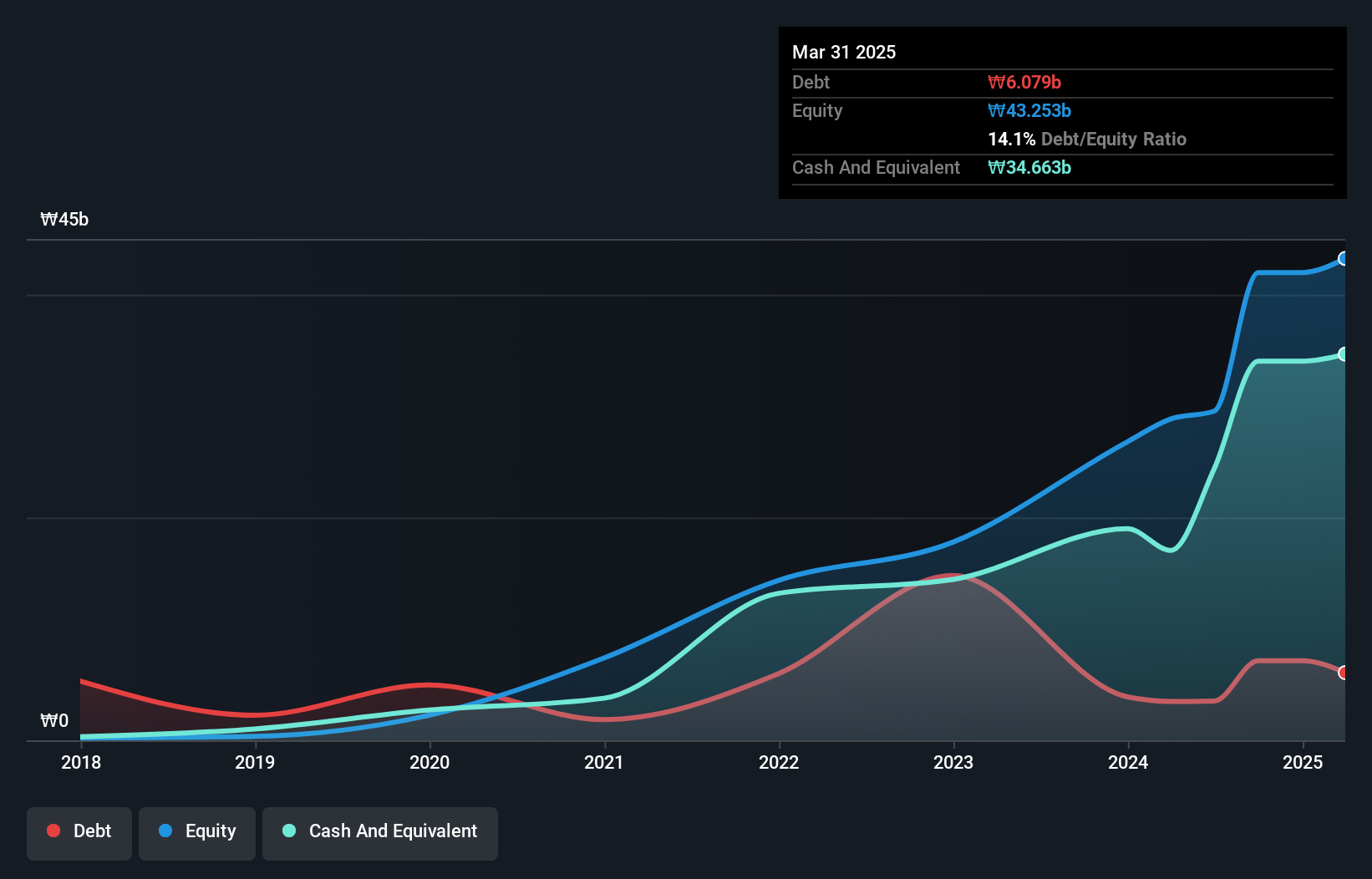- South Korea
- /
- Aerospace & Defense
- /
- KOSDAQ:A474610
Here's Why RF Systems (KOSDAQ:474610) Can Manage Its Debt Responsibly
Warren Buffett famously said, 'Volatility is far from synonymous with risk.' So it might be obvious that you need to consider debt, when you think about how risky any given stock is, because too much debt can sink a company. Importantly, RF Systems Co., Ltd. (KOSDAQ:474610) does carry debt. But is this debt a concern to shareholders?
When Is Debt Dangerous?
Debt and other liabilities become risky for a business when it cannot easily fulfill those obligations, either with free cash flow or by raising capital at an attractive price. Part and parcel of capitalism is the process of 'creative destruction' where failed businesses are mercilessly liquidated by their bankers. However, a more usual (but still expensive) situation is where a company must dilute shareholders at a cheap share price simply to get debt under control. Of course, debt can be an important tool in businesses, particularly capital heavy businesses. The first thing to do when considering how much debt a business uses is to look at its cash and debt together.
How Much Debt Does RF Systems Carry?
The image below, which you can click on for greater detail, shows that at March 2025 RF Systems had debt of ₩6.08b, up from ₩3.49b in one year. But on the other hand it also has ₩34.7b in cash, leading to a ₩28.6b net cash position.

How Healthy Is RF Systems' Balance Sheet?
We can see from the most recent balance sheet that RF Systems had liabilities of ₩22.2b falling due within a year, and liabilities of ₩5.90b due beyond that. On the other hand, it had cash of ₩34.7b and ₩4.61b worth of receivables due within a year. So it can boast ₩11.2b more liquid assets than total liabilities.
This excess liquidity suggests that RF Systems is taking a careful approach to debt. Due to its strong net asset position, it is not likely to face issues with its lenders. Succinctly put, RF Systems boasts net cash, so it's fair to say it does not have a heavy debt load!
View our latest analysis for RF Systems
The modesty of its debt load may become crucial for RF Systems if management cannot prevent a repeat of the 32% cut to EBIT over the last year. Falling earnings (if the trend continues) could eventually make even modest debt quite risky. There's no doubt that we learn most about debt from the balance sheet. But you can't view debt in total isolation; since RF Systems will need earnings to service that debt. So if you're keen to discover more about its earnings, it might be worth checking out this graph of its long term earnings trend.
Finally, a business needs free cash flow to pay off debt; accounting profits just don't cut it. RF Systems may have net cash on the balance sheet, but it is still interesting to look at how well the business converts its earnings before interest and tax (EBIT) to free cash flow, because that will influence both its need for, and its capacity to manage debt. Over the last three years, RF Systems saw substantial negative free cash flow, in total. While that may be a result of expenditure for growth, it does make the debt far more risky.
Summing Up
While we empathize with investors who find debt concerning, you should keep in mind that RF Systems has net cash of ₩28.6b, as well as more liquid assets than liabilities. So we don't have any problem with RF Systems's use of debt. The balance sheet is clearly the area to focus on when you are analysing debt. However, not all investment risk resides within the balance sheet - far from it. For instance, we've identified 2 warning signs for RF Systems (1 is a bit concerning) you should be aware of.
If you're interested in investing in businesses that can grow profits without the burden of debt, then check out this free list of growing businesses that have net cash on the balance sheet.
New: AI Stock Screener & Alerts
Our new AI Stock Screener scans the market every day to uncover opportunities.
• Dividend Powerhouses (3%+ Yield)
• Undervalued Small Caps with Insider Buying
• High growth Tech and AI Companies
Or build your own from over 50 metrics.
Have feedback on this article? Concerned about the content? Get in touch with us directly. Alternatively, email editorial-team (at) simplywallst.com.
This article by Simply Wall St is general in nature. We provide commentary based on historical data and analyst forecasts only using an unbiased methodology and our articles are not intended to be financial advice. It does not constitute a recommendation to buy or sell any stock, and does not take account of your objectives, or your financial situation. We aim to bring you long-term focused analysis driven by fundamental data. Note that our analysis may not factor in the latest price-sensitive company announcements or qualitative material. Simply Wall St has no position in any stocks mentioned.
About KOSDAQ:A474610
RF Systems
Designs and manufactures wireless communication devices, such as antenna for radar and guided missiles.
Excellent balance sheet with very low risk.
Market Insights
Community Narratives



